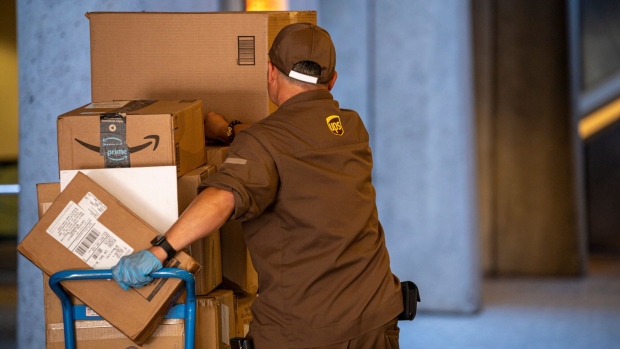Mar 26, 2024
UPS Sees Sales, Profit Growth Coming Out of ‘Difficult’ 2023
, Bloomberg News

(Bloomberg) -- United Parcel Service Inc. expects sales and profit to grow over the next three years as the courier overcomes soft demand for package delivery coming out of the pandemic. But investors were skeptical the targets are within reach, and the stock fell.
Annual consolidated revenue will climb as high as $114 billion in 2026, UPS said Tuesday in a statement detailing financial targets. That would mark a 25% rise from last year’s total of about $91 billion. The company expects its adjusted operating margin to surpass 13% in three years.
The company also held an investor presentation on Tuesday morning where it explained its strategy over the next three years. One area of concern is that these targets are “fairly aggressive,” and the company hadn’t initially provided a convincing case on how it would meet them, JP Morgan analysts wrote in a research report.
The company’s sales growth projections also will likely mean that it has to raise prices, which will be difficult because the industry currently has too much capacity, analysts at Morgan Stanley wrote in a note to clients.
The shares fell 3.4% at 11:17 a.m. in New York.
The long-term outlook shows how the company is contending with the challenges of flagging volume and high labor expenses after reaching a costly new union agreement last year. Shipping demand has been impacted as shoppers buy more in stores post-pandemic and inflation crimps purchasing power.
Chief Executive Officer Carol Tomé has pushed a strategic plan since taking the reins in 2020 to become “better not bigger,” an initiative to focus on more profitable business potentially at the expense of volume growth. The effort helped UPS’ market value roughly double in her first two years.
The courier has faced increased competition lately, including from the US Postal Service, which has hurt margins post-pandemic.
The company agreed to a new union labor deal last year that increases wages and benefits by an average of 3.3% over five years, with the biggest increase coming in 2024 with a 10% jump. The deal also sees upwards adjustments to pension and health benefits and other expenses, including a new paid holiday.
UPS said in January that it would cut 12,000 white-collar jobs — about 14% of its full- and part-time managers — to cut costs.
The company also said earlier this year it would explore the sale of its Coyote truck brokerage business. That came after UPS announced a deal to buy MNX Global Logistics in November for an undisclosed sum to build out its health-care transportation business, having previously bought Marken in 2016.
(Updates throughout.)
©2024 Bloomberg L.P.


